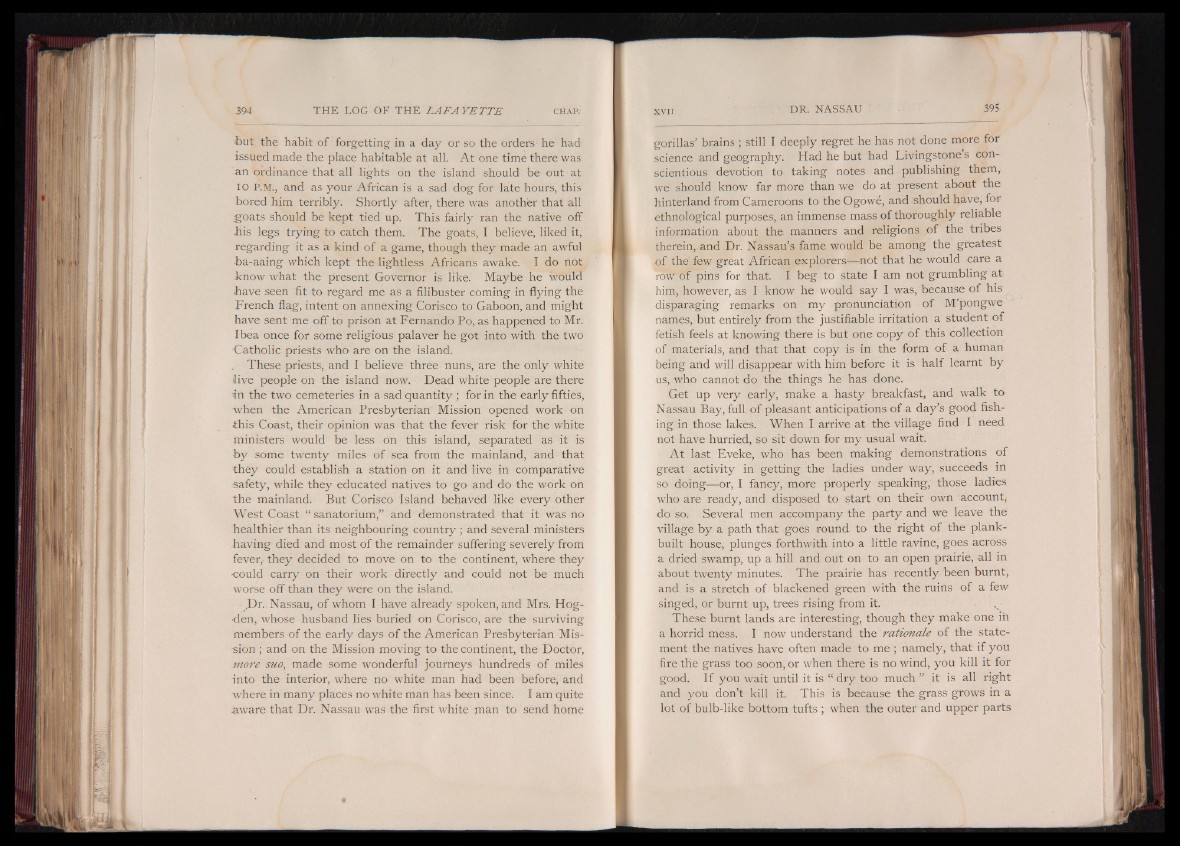
but the habit of forgetting in a day or so the orders' he had
issued made the place habitable at all. At one time there was
an ordinance that all lights on the island should be out at
10 P.M., and as your African is a sad dog for late hours, this
bored him terribly. Shortly after, there was another that all
goats should be kept tied up. This fairly ran the native off
his legs trying to catch them. The goats, I believe, liked it,
regarding it as a kind of a game, though they made an awful
ha-aaing which kept the lightless Africans awake. I do not
know what the present Governor is like. Maybe he would
have seen fit to regard me as a filibuster coming in flying the
French flag, intent on annexing Corisco to Gaboon, and might
have sent me off to prison at Fernando Po, as happened to Mr.
Ibea once for some religious palaver he got into with the two
Gatholic priests who are on the island.
These priests, and I believe three nuns, are the only white
live people on the island now. Dead white people are there
fii the two cemeteries in a sad quantity ; for in the early fifties,
when the American Presbyterian Mission opened work on
this Coast, their opinion was that the fever risk for the white
ministers would be less on this island, separated as it is
by some twenty miles of sea from the mainland, and that
they could establish a station on it and live in comparative
safety, while they educated natives to go and do the work on
the mainland. But Corisco Island behaved like every other
West Coast “ sanatorium,” and demonstrated that it was no
healthier than its neighbouring country ; and several ministers
having died and most of the remainder suffering severely from
fever, they decided to move on to the continent, where they
•could carry on their work directly and could not be much
worse off than they were on the island.
Dr. Nassau, of whom I have already spoken, and Mrs. Hog-
den, whose husband lies buried on Corisco, are the surviving
members of the early days of the American Presbyterian Mission
; and on the Mission moving to the continent, the Doctor,
more suo, made some wonderful journeys hundreds of miles
into the interior, where no white man had been before, and
where in many places no white man has been since. I am quite
aware that Dr. Nassau was the first white man to send home
gorillas’ brains ; still I deeply regret he has not done more for
science and geography. Had he but had Livingstone s conscientious
devotion to taking notes and publishing them,
we should know far more than we do at present about the
hinterland from Cameroons to the Ogowe, and should have, for
ethnological purposes, an immense mass of thoroughly reliable
information about the manners and religions of the tribes
therein, and Dr. Nassau’s fame would be among the greatest
qf the few great African explorers— not that he would care a
of pins for that. I beg to state I am not grumbling at
him, however, as I know he would say I was, because of his
disparaging remarks on my pronunciation of M’pongwe
names, but entirely from the justifiable irritation a student of
fetish feels at knowing there is but one copy of this collection
of materials, and that that copy is in the form of a human
being and will disappear with him before it is half learnt by
us, who cannot do the things he has done.
Get up very early, make a hasty breakfast, and walk to
Nassau Bay, full of pleasant anticipations of a day’s good fishing
in those lakes. When I arrive at the village find I need
not have hurried, so sit down for my usual wait.
A t last Eveke, who has been making demonstrations of
great activity in getting the ladies under way, succeeds in
so doing— or, I fancy, more properly speaking, those ladies
who are ready, and disposed to start on their own account,
do so: Several men accompany the party and we leave the
village by a path that goes round to the right of the plank-
built house, plunges forthwith into a little ravine, goes across
a dried swamp, up a hill and out on to an open prairie, all in
about twenty minutes. The prairie has recently been burnt,
and is a stretch of blackened green with the ruins of a few
singed, or burnt up, trees rising from it.
These burnt lands are interesting, though they make one in
a horrid mess. I now understand the rationale of the statement
the natives have often made to m e ; namely, that if you
fire the grass too soon, or when there is no wind, you kill it for
good. I f you wait until it is “ dry too much ” it is all right
and you don’t kill it. This is because the grass grows in a
lot of bulb-like bottom tufts ; when the outer and upper parts